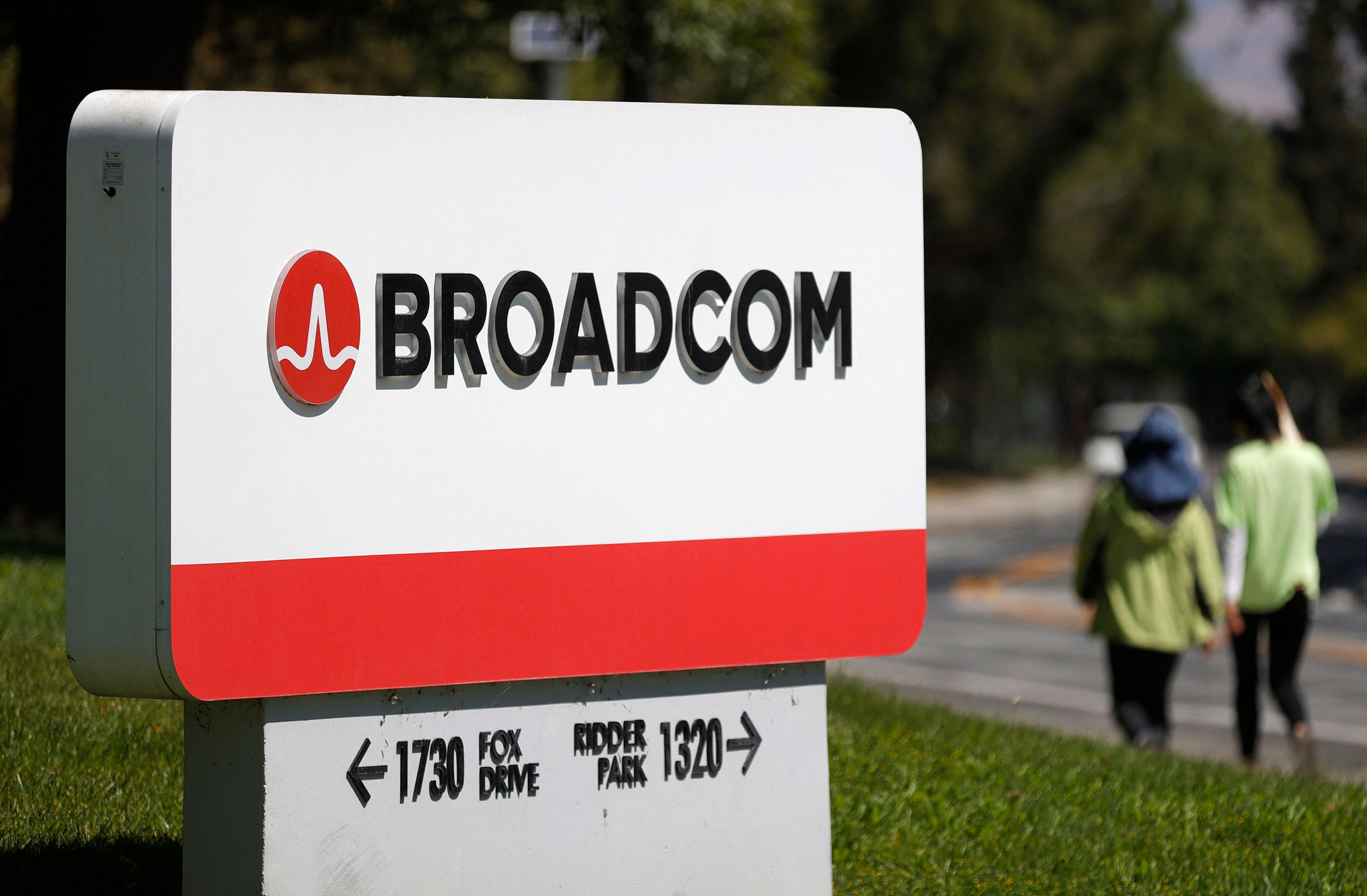Chipmaker Broadcom to buy VMware for $84 billion in record deal
Sign up now: Get ST's newsletters delivered to your inbox

The deal would furnish Broadcom with popular computing tools used by a large swath of corporations.
PHOTO: AFP
NEW YORK (NYTIMES, BLOOMBERG) - Broadcom has agreed to buy software company VMware for about US$61 billion (S$84 billion), sealing one of the largest technology deals in history and advancing the chipmaker's quest to become a force in corporate software.
The deal, which would furnish Broadcom with popular computing tools used by a large swathe of corporations, would be the world's second-biggest proposed acquisition this year, after Microsoft's US$75 billion bid for video game company Activision Blizzard, according to data from Dealogic. It marks the biggest-ever takeover for a semiconductor maker.
While the combination would make Broadcom a significant player in data centre technology and cloud computing, it is hardly a joining of household names, as is billionaire Elon Musk's high-profile pursuit of Twitter. It is a reminder, however, that tens of billions of dollars are spent every year in mergers among the many companies that make the technologies that power the Internet and large corporate computer networks.
The deal with Broadcom is the latest in a series of ownership changes for VMware, a pioneering software company that helped create some of the key technologies now commonly used in cloud computing. VMware has more than 500,000 customers around the world, and counts as partners all the major cloud providers, including Amazon, Microsoft and Google.
That makes VMware a prized asset for Broadcom chief executive Tan Hock Eng, who has built one of the largest and most diversified companies in the industry. Broadcom will spend the equivalent of US$138.23 per share for VMware in the cash-and-stock deal, it said in a statement. That is more than 40 per cent higher than VMware's stock price before rumours of a deal began to circulate last weekend.
VMware "is providing the plumbing for most of the world", said Gartner analyst Dennis Smith. VMware's software helps manage more corporate information than the combined public clouds of Amazon, Microsoft and Google - all of which have battled to bring more of that data to their services, Mr Smith said.
Mr Tan had been one of the most acquisitive forces in the chip industry, stitching Broadcom together one deal at a time, until then US President Donald Trump blocked Broadcom's proposed US$117 billion takeover of chipmaker Qualcomm in March 2018 on national security grounds. Broadcom's Singapore headquarters was an issue for regulators at the time, but the company has since switched its domicile to the United States. It is now based in San Jose, California, about 32km from VMware's Palo Alto headquarters.
Since then, Mr Tan also diversified his targets. He bought software company CA Technologies for US$18.9 billion later in 2018 and a security division of Symantec for US$10.7 billion in 2019.
Under the agreement, CA and Symantec will become a part of VMware, which will be the new name of Broadcom's software division.
With its so-called virtualisation software, which allows one computer to act like many machines and essentially makes computing more efficient, VMware would be Broadcom's flagship asset. VMware boosted the role of software in data centres and revamped how organisations manage their industrial computers. The concepts behind VMware's technology were foundational to cloud computing, which is dependent on virtualisation.
VMware reported revenue of US$12.9 billion in its last fiscal year, which ended on Jan 28. That was a 9 per cent increase from the previous year. That growth rate was much slower than the cloud computing arms of Amazon, Microsoft and Google. Founded in 1998, before the cloud boom, VMware has depended on clients that still operate their own data centres.
The deal is the latest in a series of major changes for VMware. The company lost long-time CEO Pat Gelsinger to Intel in January 2021. On May 12, it gained a new CEO, Mr Raghu Raghuram, and lost chief operating officer Sanjay Poonen on the same day. In November, the software maker became independent when it was spun off from Dell Technologies.
Broadcom's offer - coming during a market downturn for tech stocks - has the support of key VMware shareholders Michael Dell and Silver Lake, and includes a so-called go-shop provision that allows VMware to solicit competing offers.
Chipmakers like Broadcom have enjoyed booming sales in recent years, fuelled by the spread of semiconductors into more products - as well as by the need for work-from-home technology during the pandemic. But Mr Tan has warned that the boom times probably will not last.
Even after giving a rosy sales forecast in March, Mr Tan said that the semiconductor industry will not be able to stay on its current trajectory. He expects the chip business to decelerate to historical growth rates of about 5 per cent.
"If anyone tells you otherwise, don't believe it, because it has never happened," he said on a conference call at the time. Industry leaders claiming that the semiconductor industry can grow at the current rate for an extended period are "dreaming", he said.
Broadcom is targeting mid single-digit revenue growth for VMware along with Ebitda (earnings before interest, taxes, depreciation and amortisation) margins of the whole business in the mid-60 per cent range, Mr Tan said on a call with analysts. "We see a lot of benefits in putting all these various franchises we have, hardware and software, under one umbrella," he said.
VMware shares gained 3.2 per cent to US$124.36 at the close in New York on Thursday (May 26). Broadcom rose 3.6 per cent to US$550.66.


